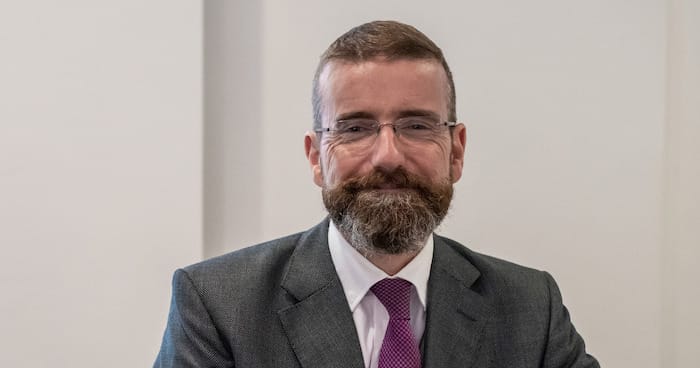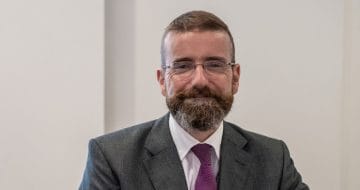Former barrister turned ULaw Deputy Vice-Chancellor Law, Professor Peter Crisp, looks at some of the key issues impacting those seeking to enter the legal profession, ahead of next week’s Legal Cheek-ULaw Summer Virtual Vacation Scheme

Ahead of next week’s Legal Cheek Summer 2022 Virtual Vacation Scheme, we sat down with The University of Law’s Deputy Vice-Chancellor Law, Professor Peter Crisp, to discuss the changing legal landscape and what advice he would give to those seeking their dream job.
The former barrister has seen many changes over the years. “When I studied law, we were very much on our own — left to our own devices,” says Crisp. “Here and now, it’s so important to empower the students with the extra skills, boosting their employability, making them well rounded future lawyers who can make a difference to a team from day one — hit the ground running.”
Legal life post-pandemic
ULaw kept its campuses open as much as possible during the pandemic. Everything is now “back to normal,” says Crisp. “Most students prefer to come in and be social.” The campuses opened fully again in September 2020. “We’ve been preparing students to be work ready for 2022 roles.”
And the outlook? Have the last two years led to market instability and uncertainty? Crisp says not; “The good news is there are lots of training contracts available — for aspiring solicitors the outlook is better than ever. We are under lawyered in the UK now.”
What about remuneration? “Even better,” Crisp tells us. “By paying NQ’s £150,000, the top corporate firms are dragging pay scales up. Regional firms are starting to compete to attract and retain the best.”
The bar has always been competitive and, Crisp explains, is becoming even more specialised. According to Bar Council figures, 3,301 candidates applied for just 246 positions via the pupillage gateway in 2021. “The vast majority of our students go on to be solicitors,” Crisp says. “The bar has shrunk, and chambers have changed and are now largely mini corporates, with CEO’s and marketing directors looking after 150 + members. But it’s a great profession and the bar course is still very popular — especially with international students.”
The recruitment process is still partially online, says Crisp. “Some firms have gone back to getting people into assessment centres and I think that is the preferred option for applicants too. But everyone’s become used to doing things remotely, and there are environmental reasons why this is still a good idea.”
There are other positive changes. In the recent past there was little point applying to the US firms or the magic circle if you hadn’t been to one of the top five Russell Group universities and graduated with a first. “This is not the case now. Even the biggest law firms have a far more diverse recruitment pool,” he explains.
Law firms are becoming far more flexible and conscious of lifestyle requirements and employee well-being. The former barrister has noticed a seismic change: “The profession is making strides — the covid pandemic has pushed it on. Appreciation for pastoral and professional support of the next generation has been remarkable over the last two years.”
New opportunities
New opportunities emerge. Tech space, social media, data protection and climate issues are the new buzz words. How do we keep up? Stand out in applications and at interviews?
“Traditional areas remain strong — corporate roles as well as more high street roles that have more social impact — immigration and family for example,” Crisp explains. “But there is no doubt that every future lawyer will need a grasp of these emerging specialisms.”
Can a computer draft a contract? “Well, yes — but at what stage do you need a lawyer to get involved?”
Students need to make sure they get involved with extracurricular events such The Legal Cheek Summer 2022 Virtual Vacation Scheme. “They need to demonstrate an understanding that technology is empowering lawyers to deliver their services to their clients more efficiently helping them manage risk and so on,” the former barrister tells us.
Environmental Social Governance (ESG) factors have fast risen to the top of the board agenda, with firms and organisations increasingly aware that a failure to address them can be detrimental to their businesses, both financially and reputationally. Specialist media sources report that an estimated $120 billion (£99 billion) is being poured into sustainable investments alone. Crisp agrees it’s at the top of the agenda with law firms, and a practice area in itself.
He continues:
“It’s centre stage. Law firms are keen to be seen to be giving something back. Laura Yeates at Clifford Chance has set up a sustainable recruitment alliance which is a kind of charter to recruit more sustainably, and the many firms have signed up. The idea is to recruit without tons of merchandise and bits of paper, exploiting online if possible. Applicants and interviewees should be aware of ESG, understand what it stands for and why it’s important.”
Commercial awareness
Commercial awareness is drummed into ULaw students from the get-go. “We have a commercial awareness competition — students become mini-entrepreneurs and have to do a presentation,” Crisp explains. “Getting them excited about it is important because a law firm needs to be profitable at the end of the day. Most of the clients are businesses who are not particularly interested in the law — they want to know how their lawyer can help them achieve something or be advised on risk of doing something else.”
Future lawyers also need to know that they will usually be part of a wider team, not only of other lawyers but accountants, barristers, other experts, says Crisp. “Applicants need to be aware of how the complete service to the client fits together.”
The winning formula
The outlook is far from bleak for law students. Crisp says “there are huge opportunities for future lawyers. Student applicants need to be focussed but flexible. Be authentic. Identify their skill set. Demonstrate their passion for the profession. Ask themselves: What kind of atmosphere do I want to work in? A big corporate firm is not for everyone: some prefer smaller niche firms with a more human face and lots of private client work. It’s never impossible to change lanes (firms and specialisms) down the line, but with student debt to factor in it’s a good idea to try and get it right in the first place.”
Peter Crisp will be speaking at The Legal Cheek Summer 2022 Virtual Vacation Scheme, run in partnership with The University of Law, which takes place next week from Monday 4 July until Friday 8 July. You can apply to attend the scheme, which is free, now.
About Legal Cheek Careers posts.


